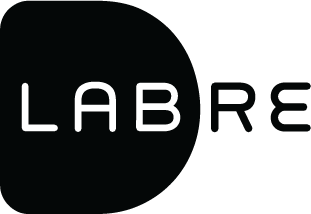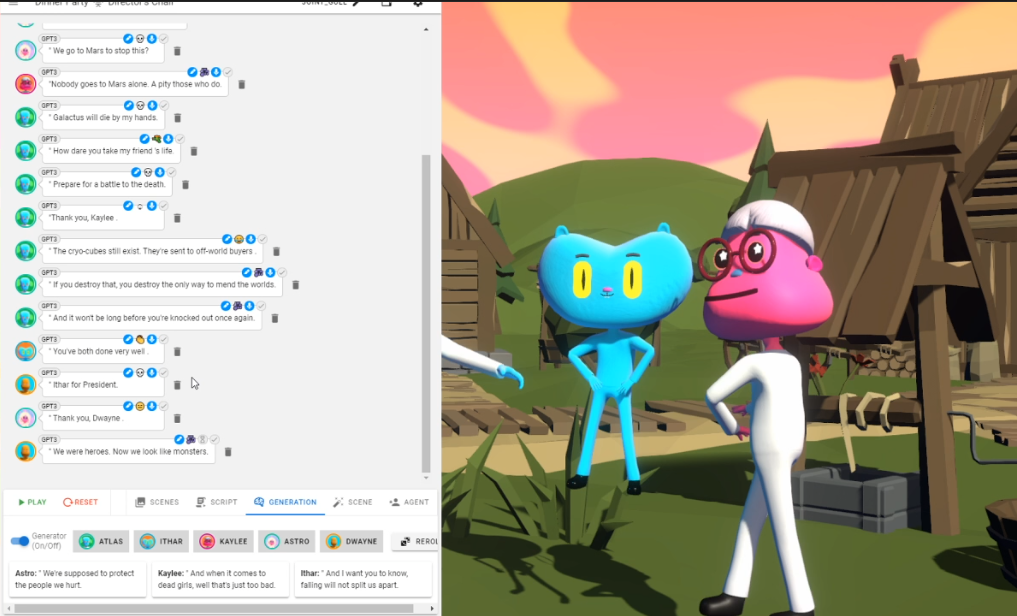DInner Party: DIRECTING A LIVE AI SITCOM
Thoughts from my experience directing a real-time AI sitcom
Originally published Oct 16th 2021
Dinner Party (now Robots Make TV) is a groundbreaking project by Transitional Forms that stands at the forefront of an emerging era in the entertainment industry, where Artificial Intelligence is beginning to play a pivotal role. This initiative integrates advanced AI and 3D graphics to produce an interactive experience, simulating a live event with animated characters capable of conducting conversations in real-time, based on user inputs.
The process of creating these AI-driven scenarios involves three critical stages: staging, starting, and steering. The initial 'staging' phase is about setting up the environment. It involves choosing an appropriate visual setting, selecting characters for the scene, and establishing a basic narrative or topic to guide the AI's content generation. The 'starting' phase allows the director to script the opening lines, ensuring the conversation begins in alignment with the desired thematic direction. The 'steering' phase is more dynamic, requiring ongoing decision-making to guide and shape the conversation based on the AI's generated responses.
From the Director’s Chair
Dinner Party web UI for director control includes tool to stage, start and steer the experience.
At the core of this technology is OpenAI's GPT-3, a cutting-edge language prediction model. GPT-3 operates through deep learning algorithms, analyzing vast amounts of data sourced from the internet to generate human-like text. This AI model can predict and generate text with remarkable accuracy, contributing to the fluidity of the conversations in the "Dinner Party" scenarios.
The effectiveness of the AI is demonstrated through its ability to engage in meaningful dialogue on complex topics. For instance, when given a prompt involving characters discussing the 'meaning of life,' the AI can construct a coherent conversation by referencing a multitude of philosophical texts it has analyzed, showcasing its ability to mimic human-like discourse and reasoning.
The project's potential was further evidenced during a live demonstration on Twitch. Here, the AI, guided by human interaction, showcased its capabilities in real-time, affirming its proficiency in generating content spontaneously. This demonstration, available for review through a highlight reel, provides tangible evidence of the AI's capacity for this kind of creative content generation.
One notable experiment within this project was the creation of a scene inspired by the film "My Dinner with André." In this instance, the AI was provided with a context resembling the movie's plot, involving characters engaging in a deep, reflective conversation. The success of this experiment underscores the system's potential for developing content that is not only entertaining but also rich in depth and relevance.
Currently, AI-generated content is gaining traction, particularly within niche audience segments. It tends to thrive on its novelty, with a unique, often absurdist humor that has found a home within certain viewer demographics. This style is evident in projects like "Netflix by Bots," where AI-generated scripts, drawing on established movie tropes, create a blend of familiarity and unpredictability that audiences find engaging.
However, the necessity for human oversight in these endeavors remains clear. AI, for all its advancements, still requires direction to ensure the content remains coherent and true to intended themes. Without this, the narratives risk becoming disjointed or losing relevance due to the AI's lack of contextual understanding or emotional nuance.
In the foreseeable future, AI is not poised to replace human content creators in the entertainment industry. Instead, it is emerging as a valuable tool that can complement human creativity, particularly in genres like comedy or children's content, where its penchant for quirky, unpredictable content can be a significant asset.
For those looking to harness AI's capabilities in content creation, a deep understanding of language and narrative technique is crucial. Effective collaboration with AI requires the ability to guide and influence the narrative subtly, skills often associated with disciplines like poetry, where expression is both precise and rich in metaphorical depth.
Looking ahead, advancements in AI suggest a future where it could operate more independently, creating personalized content based on individual user preferences and histories. This evolution points toward a more interactive and tailored entertainment experience, extending into educational applications and beyond.
However, this trajectory also brings potential challenges and ethical considerations, particularly regarding data security, privacy, and the psychological impacts of highly personalized content. These issues are complex and multifaceted, warranting further detailed exploration and discussion.
In conclusion, the "Dinner Party" project represents a significant step forward in the intersection of AI and entertainment, offering a glimpse into the potential future of content generation while also highlighting the continuing importance of human oversight and ethical considerations in these advancements.


